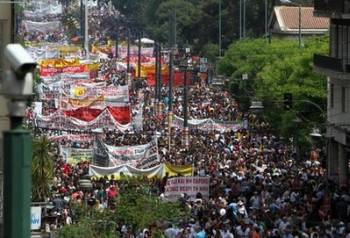European Union
General strike brings Greece to a standstill
13/05/2011

On May 11, as a result of a 24-hour general strike, Greece found itself completely paralyzed in a protest against the new austerity measures announced some weeks ago by the government and its plan of privatizations that seeks to take in up to 50 billion euros. The strike, that was widely observed by workers, who fear future layoffs and are angrily experiencing the high level of unemployment, increased taxes and disappearing public services, coincided with an official visit by high-ranking representatives and commissioners of the European Union (EU), and was called by the two main union federations, ADEDY and GSEE, from the public and private sectors, respectively.
The strike, the second this year, and the eleventh since the first austerity measures were announced more than a year ago, forced cancellation of hundreds of flights, owing to the work stoppage by the air traffic controllers; boats and cruises did not set sail, because the port workers adhered to the strike. Furthermore, railway workers joined in, and the public transport lines only worked in Athens, to permit the arrival of demonstrators in the city center. Closed high schools and hospitals with minimal services that only saw emergency cases, as well as the closing of daycare centers, government ministries and public agencies, confirm the high level of participation in the strike.
As part of the action, tens of thousands of workers, young people and retirees went out to the streets of the main cities of Greece to protest the most recent round of cuts and measures announced to reduce the deficit in public spending.
In Athens, during the course of a march that attracted more than 20,000 demonstrators, a group of young people was brutally repressed by anti-riot cops, who threw tear gas and grenades near the Parliament and the place where George Papakonstantinou, the Finance Minister, was meeting with the EU and IMF delegations. As a result, one of the youths was gravely wounded and is hospitalized in a serious condition. In Salonica, the second-largest city in the country, more than 10,000 people participated in the protests, and, although there were no confrontations, the strong police presence was noticeable.
The official EU and IMF visit had the purpose of determining it they were going to grant Greece the fifth installment of the bailout package of 110 billion euros, and if they would offer the country better credit conditions, to avoid a restructuring of the debt. Because of that, the strike took place in a context of growing dissatisfaction with the government, in view of the fear that the country would have to restructure its debts, since, despite last year’s bailout package, the crisis continues to intensify, and the country has been unable to reduce its debts, amidst a decline in economic activity that has led to a big increase in unemployment and the closure of thousands of workshops, factories and small and medium-sized stores.
In the year since the agreement with the EU and the IMF, the socialist government headed by George Papandreou has cut wages and pensions, wages have fallen by 20%, and joblessness has reached 15.1%.
The Greek crisis is an unresolved problem that is arousing fear of future layoffs among workers, uncertainty about the outlook for the economy, and anger at the constant requests for workers and the people to make sacrifices, while the country’s debts increase. The big support for the strike demonstrates the willingness to struggle, but, at the same time, indicates that it is urgent to go beyond the politics of the unions, that are limited to calling strikes to let off steam and do not seek to build a workers’ alternative to the country’s crisis. The new package of measures shows that the recipe of the Greek government, the EU and the IMF, goes nowhere, that it is time to seek a solution from the workers and the people













